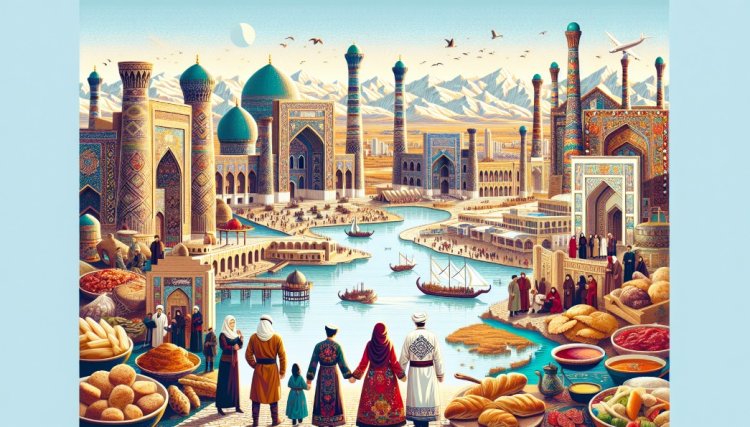Exploring the Rich Culture and Vibrant Cuisine of Uzbekistan
Embark on a journey through Uzbekistan, a land overflowing with cultural treasures and culinary delights. Discover ancient cities, stunning architecture, and a diverse cuisine that tantalizes the taste buds.

Introduction to Uzbekistan
Uzbekistan, officially known as the Republic of Uzbekistan, is a prime country in Central Asia. It covers a vast land area of 447,400 square kilometers and has a population of approximately 35 million people, making it the most populous country in the region.
Uzbekistan has rich historical significance as it was a prominent trading point along the Silk Road, attracting the attention of great rulers such as Alexander the Great and Genghis Khan. The region flourished under the rule of Emir Timur, who brought scholars and philosophers to Samarkand and developed the culture there.
In 1991, Uzbekistan gained independence from the Soviet Union and has since taken pride in its own culture and history. The capital city, Tashkent, is the most popular in Uzbekistan and serves as the initial destination for visitors. Other popular cities include Bukhara and Samarkand, which are known for their historical architecture.
Uzbekistan shares borders with Afghanistan, Turkmenistan, Kyrgyzstan, Tajikistan, and Kazakhstan. Despite its lack of coastline, the country is home to the Aral Sea, which used to be one of the world's largest lakes. Uzbekistan is also known for its natural resources, including gold, natural gas, oil, and coal.
Culture and Language in Uzbekistan
Learning the Uzbek language is of great importance when visiting Uzbekistan. While Russian is also widely spoken, knowing some Uzbek phrases will greatly enhance your experience and interactions with locals.
Islam holds significant significance in Uzbekistan, with over 90 percent of the population adhering to the religion. You will notice the Islamic influences in the architecture, traditions, and daily life of the Uzbek people.
Kazakhstan and Russia in particular have influenced Uzbekistan. The culture and customs of these countries have shaped the social fabric and lifestyle of Uzbekistan.
One of the most remarkable aspects of Uzbek culture is the hospitality and friendliness of the Uzbek people. They are known for warmly welcoming visitors, often inviting them into their homes, and offering delicious Uzbek cuisine.
Exploring Uzbekistan's Food Culture
When visiting Uzbekistan, exploring the local food culture is a must. Here are some key aspects to keep in mind:
Affordability of Bread and Meat Dishes
One of the first things you'll notice in Uzbekistan is the abundance of delicious bread and meat dishes. The affordability of these dishes is a pleasant surprise, with bread costing around $1 and high-quality meat dishes, like shish kebabs, priced at just $3.
Marketplaces and Free Samples
Uzbekistan's marketplaces are a must-visit for food lovers. As you stroll through the colorful bazaars, vendors will often offer you free samples of their products. This is a great way to experience the local flavors and see the confidence these vendors have in the quality of their goods.
Beware of Potential Scams
While Uzbekistan is generally a safe and friendly country, it's important to be aware of potential scams, especially as a tourist. Some individuals may try to overcharge you for taxis or demand entrance fees at free attractions. Stay alert and be cautious of these situations.
Benefits of Hiring a Local Guide
To enhance your food exploration in Uzbekistan, consider hiring a local guide. A local guide can help you navigate the markets, recommend the best places to eat, and protect you from potential scams. They can also provide valuable insights into the culture and history of Uzbekistan.
Exploring Uzbekistan's food culture is an exciting and delicious experience. From affordable bread and meat dishes to vibrant marketplaces, there is something to satisfy every food lover's palate. Just make sure to stay alert and consider hiring a local guide for an enriching culinary adventure.
Hospitality and Local Experiences
When visiting Uzbekistan, you can expect a warm welcome from the locals. The Uzbek people are known for their hospitality and friendliness towards visitors. You may even be invited into their homes, where they will gladly host you and make you feel at home.
In rural areas, the hospitality is even more pronounced. Local families in these areas often go out of their way to welcome visitors, feed them, and provide a unique cultural experience. It's a great opportunity to immerse yourself in the local way of life and learn about their traditions and customs.
One of the highlights of experiencing the local culture in Uzbekistan is its cuisine. Traditional Uzbek cuisine is famous for its delicious meat dishes, such as shish kebabs and pilaf. You'll also have the chance to enjoy their tea culture, with both black and green tea being consumed abundantly. Don't forget to try the traditional bread, which is made with utmost care and passion by local bakers.
When planning your visit to Uzbekistan, it's important to consider the climate. The country experiences hot summers, with temperatures often exceeding 50 degrees Celsius in cities like Tashkent, Bukhara, and Samarkand. It's recommended to visit between August and November when the temperatures are more moderate and enjoyable.
Architectural Heritage and Entertainment
Uzbekistan's rich history is reflected in its architectural heritage, particularly in cities like Khiva. As one of the oldest cities in the region, Khiva boasts meticulously preserved buildings dating back to the 6th century. Walking through its streets feels like stepping back in time, with the absence of modern structures creating a truly immersive experience.
When evening falls in cities like Bukhara, Tashkent, and Samarkand, the vibrant nightlife comes alive. Restaurants offer not only delicious meals but also entertainment in the form of traditional Uzbek dances. These dances, unique to Central Asian culture, are graceful and captivating, performed with elegance and precision. Dancers glide across the stage like swans, wearing traditional costumes that sparkle brightly.
In Uzbekistan, there are no restrictions on alcohol, so you can enjoy your evenings with a variety of drinks, including vodka and whiskey. Nightclubs in cities like Tashkent offer a lively atmosphere, perfect for those looking for a fun night out. The locals in Uzbekistan love to have a good time, and the nightclubs are often packed to the brim, especially on weekends.
While enjoying the entertainment and nightlife, it's important to remember the earthquake history of Tashkent. In 1966, the city experienced a devastating earthquake with a magnitude of 8. Over 36,000 buildings were destroyed, leaving over 300,000 people homeless. The city was rebuilt with substantial aid from the Soviet Union, resulting in a more modern and beautiful structure than before.
Unique Aspects of Daily Life in Uzbekistan
When it comes to daily life in Uzbekistan, several unique aspects set it apart from other countries:
Housing and Population Density
Despite its vast land area, Uzbekistan has a relatively small population, which leads to spacious roads and considerable distances between buildings in its cities. The architecture of the buildings also bears a resemblance to Russian buildings, reflecting the country's Soviet influence.
Dominance of Chevrolet Cars
One interesting aspect of daily life in Uzbekistan is the dominance of Chevrolet cars on the roads. This is due to the country's collaboration with Chevrolet to produce more affordable vehicles for its people. As a result, you'll see Chevrolet vehicles flooding the streets of Uzbekistan.
Traditional Sports and Activities
In rural areas of Uzbekistan, traditional sports and activities are still a part of daily life. Horseback riding and equestrianism are popular, as they help preserve the cultural traditions passed down from ancestors.
Carpet Weaving and Other Crafts
Uzbekistan is known for its craftsmanship, particularly in carpet weaving. Uzbek women engage in the art of carpet weaving, creating beautiful handcrafted carpets that are sold in bazaars to earn a living. Traditional crafts and arts, such as pottery and embroidery, are also valued in Uzbekistan.
Uzbekistan's Culinary Delights
Experience the rich and vibrant culinary culture of Uzbekistan during your visit to this Central Asian country. From traditional dishes to street food, Uzbekistan offers a delightful array of flavors and culinary traditions.
Preparation and Significance of Pilaf
One of the most iconic and beloved dishes in Uzbek cuisine is pilaf. Cooked in large cauldrons, pilaf is a flavorful combination of rice, meat, chickpeas, carrots, and oil. The meat is thoroughly cooked in oil, resulting in tender and succulent flavors. The addition of the carrots gives the pilaf a delightful hue. Pilaf holds a special place in Uzbek culture and is considered a symbol of hospitality and celebration.
Love for Bread, Rice, and Meat
Bread, rice, and meat are the cornerstones of Uzbek cuisine. Uzbekistan is known for its abundance of delicious bread, which is made with utmost care and passion by local bakers. Rice is a staple ingredient in many dishes, including pilaf. Meat, including beef, lamb, and horse meat, is widely enjoyed and adds richness and flavor to Uzbek dishes.
Traditional Pastry 'Samsa'
When exploring the rural areas of Uzbekistan, be sure to try the traditional pastry called 'Samsa'. Resembling a seashell in appearance, Samsa is typically filled with chicken or other types of meat. The pastry is prepared using traditional oven fires, adding a unique smoky flavor. Samsa is a popular snack and a favorite among locals.
The vibrancy of Street Food Culture
Uzbekistan's street food culture is vibrant and enticing. As you stroll through the streets, you'll come across numerous street vendors selling a variety of delicious snacks and dishes. Indulge in sizzling kebabs, flavorful dumplings, and aromatic teas. Don't miss the opportunity to try the local street food and immerse yourself in the lively atmosphere of Uzbekistan's bustling streets.
Modern Influences and Challenges
Uzbekistan, like many other countries, faces various modern influences and challenges in its society. These factors play a significant role in shaping the country's culture and daily life.
Russian Influence and Language
Russian has a strong presence in Uzbekistan, both in daily life and in the written language. Many signs and bookstores feature Russian writings, and the language is widely spoken. This influence is a result of the country's history as part of the Soviet Union.
Street Vendors and Western Chain Stores
In recent years, Uzbekistan has opened up to Western chain stores, bringing a new wave of consumerism to the country. Alongside these stores, traditional street vendors still play a significant role in the local economy, selling a variety of products along the roadsides.
Socioeconomic Disparities
Despite its rich culture and history, Uzbekistan still faces socioeconomic disparities. While some parts of the country experience economic growth and development, there are still areas where poverty and inequality persist. This disparity can be seen in the presence of children begging on the streets of Tashkent.
Transportation Options
Transportation in Uzbekistan is primarily facilitated by the metro system in Tashkent and trains for intercity travel. The metro system, built during the Soviet era, showcases the country's architectural heritage. However, the transportation system still faces challenges in terms of accessibility and efficiency.
Despite these influences and challenges, Uzbekistan continues to preserve its rich culture and hospitality. The country's unique blend of tradition and modernity creates a vibrant and dynamic society for both locals and visitors to experience.
Conclusion
Uzbekistan is a country rich in cultural heritage and vibrant cuisine. From its historical significance along the Silk Road to its warm hospitality, Uzbekistan offers a unique and memorable travel experience. The affordability of bread and meat dishes, the vibrant marketplaces, and the unique street food culture make it a haven for food lovers.
However, Uzbekistan also faces modern influences and challenges. The Russian influence and language, the rise of Western chain stores, and socioeconomic disparities are factors that shape the country's culture and daily life. The transportation system, particularly the metro in Tashkent, showcases the architectural heritage of the region.
Despite these challenges, Uzbekistan continues to preserve its rich culture and hospitality. Supporting the local economy and hiring a local guide can enhance the travel experience and contribute to the livelihood of the Uzbek people. By exploring Uzbekistan's culinary delights and embracing its unique daily life, visitors can immerse themselves in the vibrant culture of this Central Asian country.
FAQ
Here are some frequently asked questions about visiting Uzbekistan:
Can I visit Uzbekistan without a visa?
Yes, most nationalities can enter Uzbekistan without a visa for tourism purposes. However, if you plan to stay for an extended period or work in Uzbekistan, you will need to obtain a residence permit and a work permit.
What is the official language of Uzbekistan?
The official language of Uzbekistan is Uzbek. Russian is also widely spoken in the country.
Is Uzbekistan a safe country to visit?
Yes, Uzbekistan is generally a safe country for tourists. The Uzbek people are known for their hospitality and friendliness towards visitors. However, it's always important to stay alert and be cautious of potential scams, especially in tourist areas.
What are the popular tourist destinations in Uzbekistan?
Some popular tourist destinations in Uzbekistan include Tashkent (the capital city), Bukhara, and Samarkand. These cities are known for their historical architecture and rich cultural heritage.
How can I protect myself from scams while visiting Uzbekistan?
To protect yourself from scams while visiting Uzbekistan, it's important to stay alert and be cautious of situations that seem suspicious. Consider hiring a local guide who can help navigate the markets and recommend trustworthy places to visit. Additionally, be aware of common scams, such as overcharging for taxis or demanding entrance fees at free attractions.



 admin
admin 










